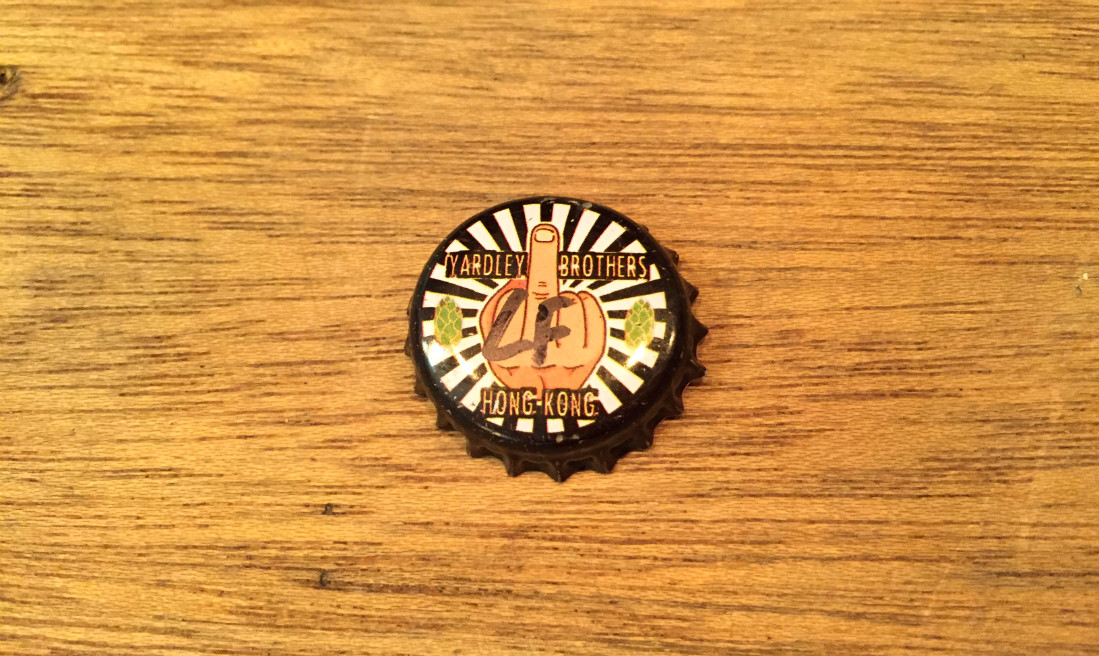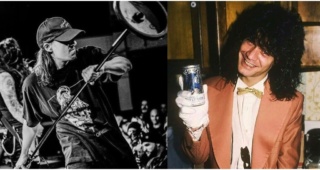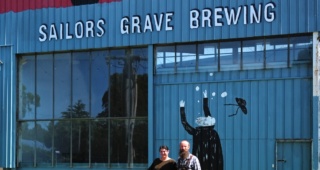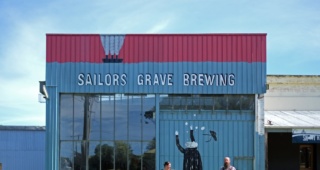Without resorting to idiom, it can be said that a significant turning point in the life of Luke Yardley came when he saw his life going down the toilet.
“I went to a trade show and spent more than a full day looking at white toilet sets,” says Yardley, co-founder and brewmaster of Yardley Brothers Beer. “There were so many different producers of these plain white toilet seats, and we had to decide which of all these white toilet seats we should buy.”
For most of us, everyday latrine scrutiny doth not venture much further beyond its state of sanitation, which begs the question: What attributes does a European parts wholesaler temporarily posted to Asia look for in a plain white toilet seat?
“There are the bracket types, the quality of the plastic, whether or not the plastic stains…” Yardley’s boredom swells palpably as he dredges the memory. “That’s when I decided that was not for me. I wasn’t good at it. I didn’t enjoy it. I had no passion for it, at all.”
This was some years ago, when the Scotsman was on consignment in Hong Kong for a wholesaling job. It was something resembling love, not plain white toilet seats, that kept him there. “I was meant to stay for three months and then go back to Edinburgh, but I met a girl and decided not to leave,” he says.
Romantic, but as we lean forward into this story, know that that particular love affair does not end happily ever after, though it did trigger a domino effect. “I dumped her, actually, and then one of my friends married her, which was weird,” he says. “But then I met my wife.”
Somewhere along the way he opened, with his brother, one of Hong Kong’s most headstrong craft breweries, too.
The Playbook
“I had my first neutral reaction to this,” says Joseph Gauthier. “You know that Russian-German guy that was visiting? He said it was okay, and I was like c’mon, man!”
I nail Gauthier as a fellow Michigander—it’s the unmistakable accent. Yardley’s right-hand man, Gauthier laments that he wanted his brewery business card title to be “Beer Lackey,” but that Yardley wouldn’t allow it.
“Yeah, you get some people who say this is just fucking awful, and then others that say they just fucking love it!” Yardley chimes in as he pours glasses of Love It or Hate It Stout, a rather appropriate name for this rather esoteric concoction. A light-bodied stout brewed, in this case, in what amounts to a half batch (350 liters) for Yardley Brothers, Love It or Hate It polarizes with its key ingredient, marmite—10 kilos of it, in fact, which Yardley boiled down in water then pushed with CO2 into the fermenter after the primary fermentation.
The result is a 5% ABV stout that’s a little salty and a little sweet. It’s certainly interesting; you’ll either love it or, ahem, hate it. In the bigger picture, Love It or Hate It epitomizes what’s afoot in this compact 700-liter brewery that’s hidden on the fifth floor of grungy Wah Tat Industrial Centre, Block A, in middle-of-nowhere Hong Kong.
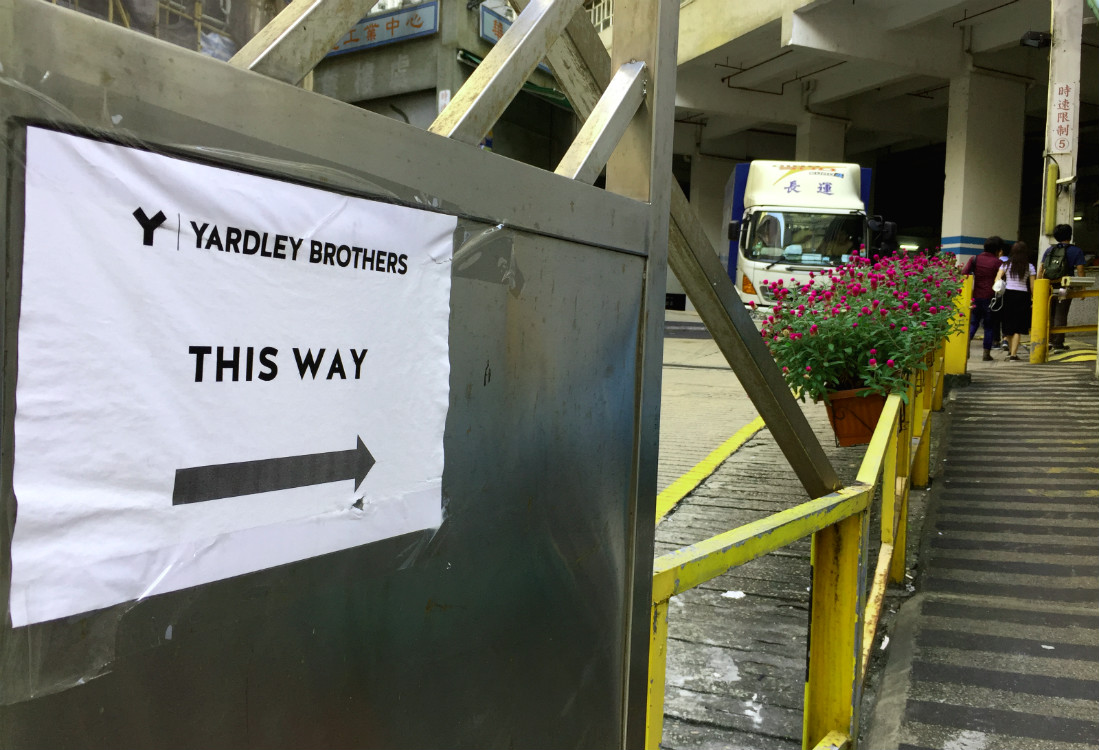
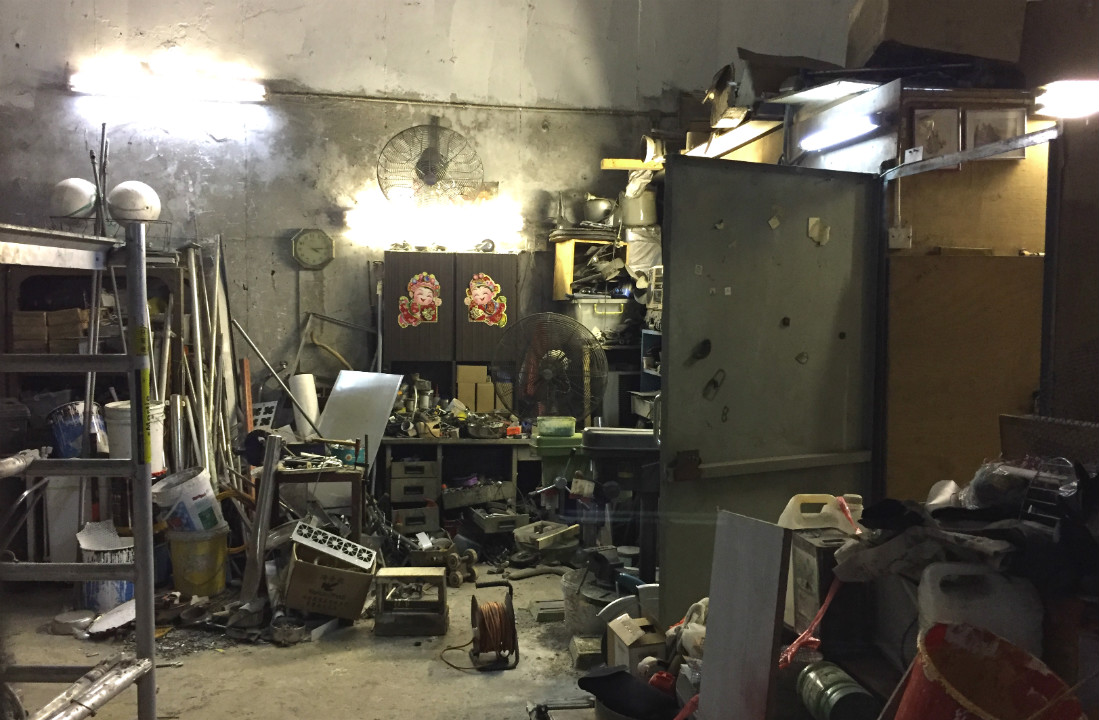
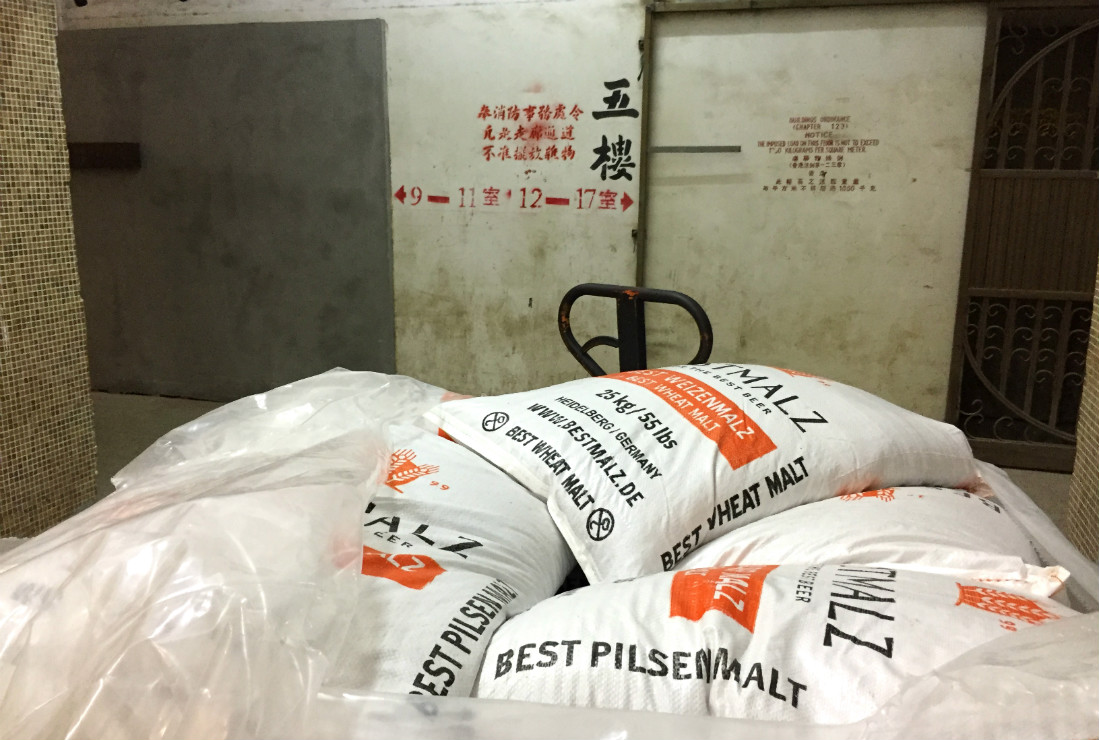
Here this two-man brewing team—Yardley’s wife, whom I don’t meet, is the brewery’s only other employee—for the most part brew what they want, when they want, and what they want changes frequently. “It’s always good to have something that people really like, and then you just make it once a month,” Yardley says with a shrug. “When it sells out it sells out, and then they can try something else.”
There are some beers, like the Lamma Island IPA and award-winning Hong Kong Bastard, that are usually available, but only in limited monthly quantities and not necessarily every month. There are then what one might call “progressive beers,” like Love It or Hate It and Machine Men, the latter a pale ale brewed with highly concentrated hop powder created by freezing fresh hops with liquid nitrogren.
Last year at Brewtopia, Hong Kong’s annual beer blowout, Yardley Brothers debuted The Beast, an ice-distilled IPA that at 25% ABV stands as the strongest beer brewed in Asia. “Joseph and I drank one bottle between the two of us, and we were pretty merry,” Yardley says. “There was a lot of chatter about that one at the festival; somebody actually stole the last bottle we had.”
And then there are small-batch specials like Mum’s Rhubarb & Orange Crumble, which Yardley brewed with fresh orange peel and fermented with lactobacillus, a type of yeast that, like Brettanomyces, brewers commonly use for souring and adding a little funk to the flavor. “It’s based on my mum’s rhubarb and orange pie, and it’s the only beer I make that mum likes,” admits Yardley. “She says the rest are rubbish—but she really likes this one!”
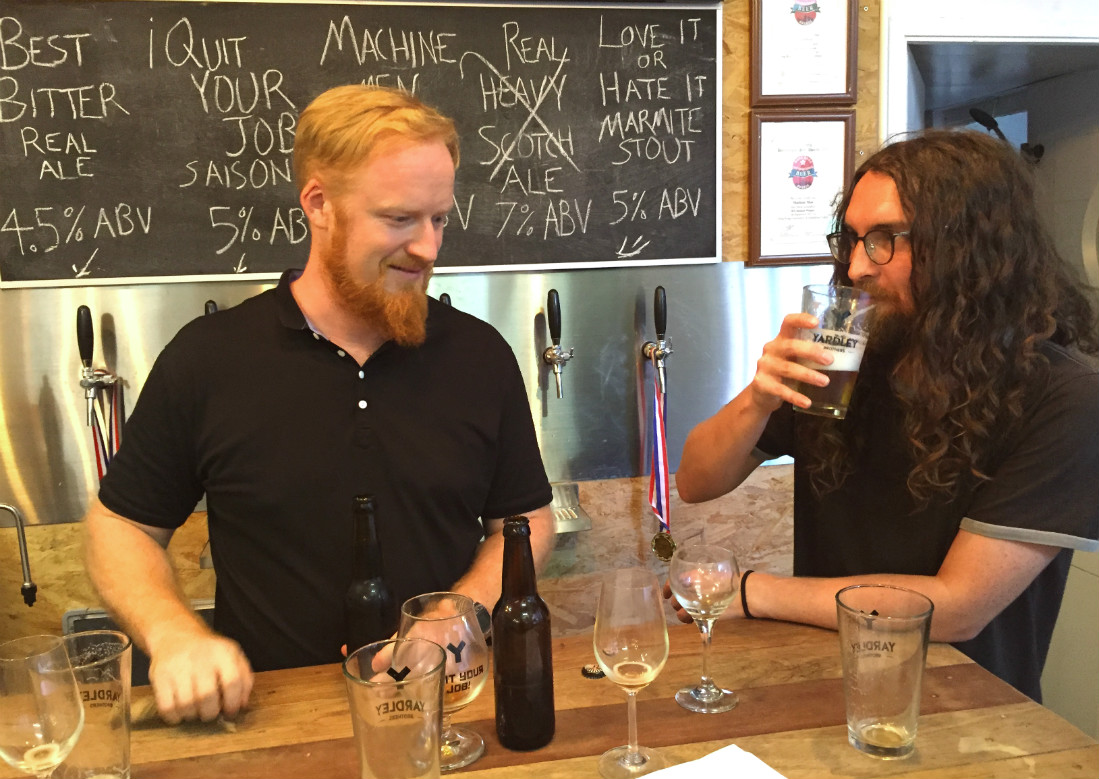
This is, indeed, not a brewery prioritizing a core set of beers. “I’d rather have creativity with a slight lack of continuity,” says Yardley. Many breweries manage both, of course, but with only so much space and staff here the line must be drawn somewhere. “Our weekly plan is fairly consistent, but the monthly plan is basically based on whatever crazy idea Luke gets,” Gauthier says.
On cue, Yardley says that one of his most recent creative itches struck in the middle of the night, just as he was nodding off. “I’m interested in doing something like a saison in a white wine barrel,” says Yardley. “This weekend, actually, I was just thinking about a rosemary-infused saison aged in a white wine barrel.” Yardley Brothers kicked off its barrel-aging program last December, shortly after I meet Yardley and Gauthier at the brewery.
Gauthier has heard it all before. “This is how I find out about most of the beers we make—Luke has a weekend.”
The Lay of the Land
Few places cradle extremes quite like Hong Kong, a cluster of 261 islands sprawling across the Pearl River Estuary at the crossroads of East and Southeast Asia.
Though spanning just more than 1,100 square kilometers (424 sq mi) in size, including 50 sq km of water—Comoros, Mauritius, and Samoa are three of the 180-plus nations that are larger—Hong Kong finds space for more than 7 million residents, making it one of the world’s five most densely populated regions. Know, too, that despite this crush of humanity more than 75% of Hong Kong’s land is undeveloped, which means that all those locals and at least 58 million annual visitors cram into habitable areas equaling about 260 sq km. It’s no surprise that this land-scarce megapolis has more skyscrapers than anywhere else in the world, and it’s not particularly close.
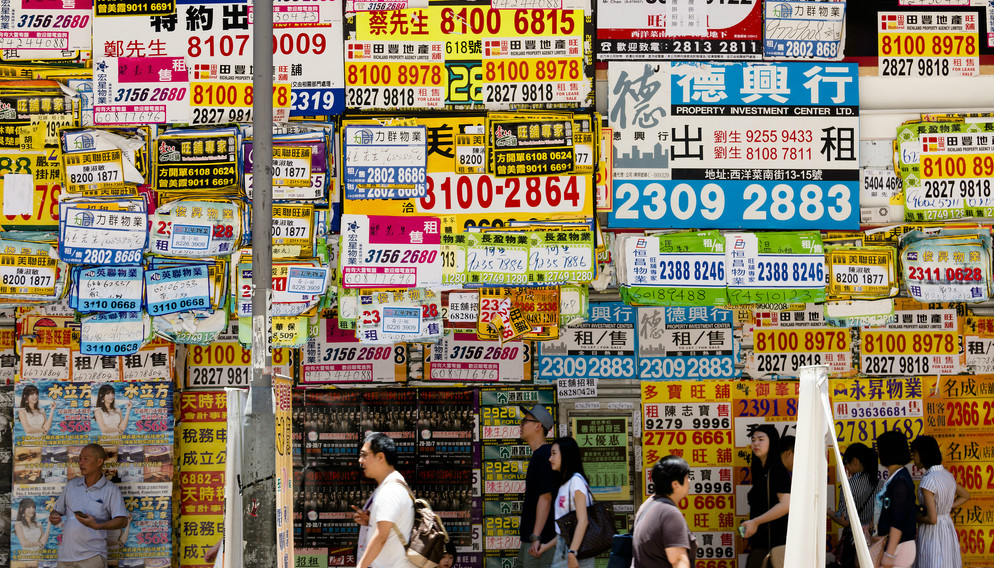
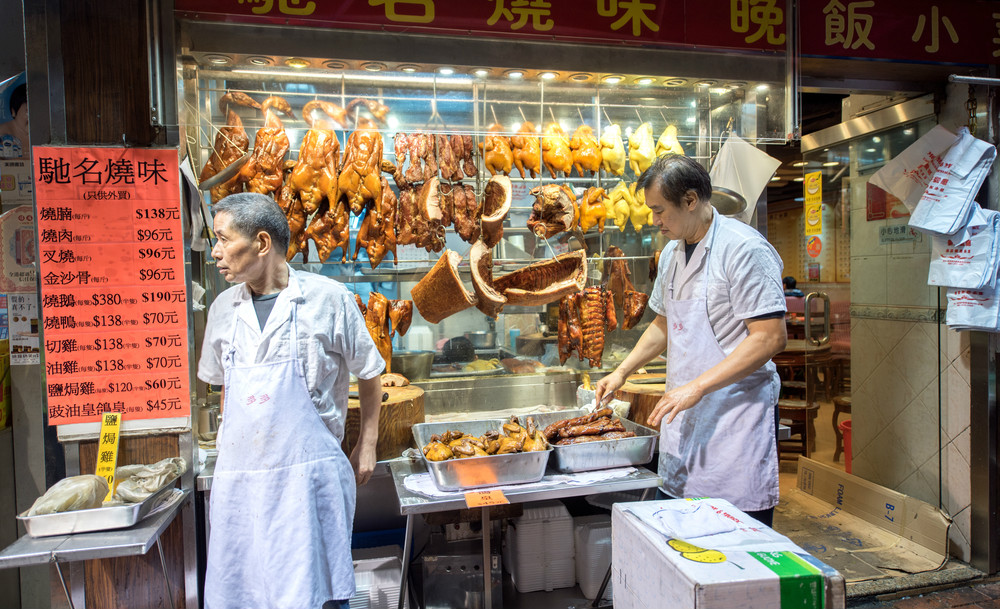
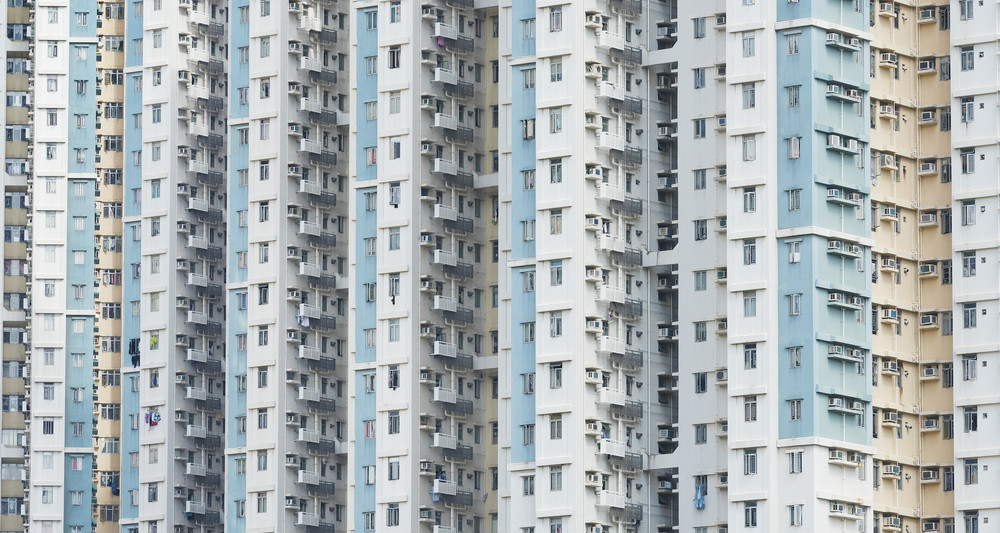

Despite the shoulder-to-shoulder living conditions and all the grimy, glorious realities of everyday urban life that go with it, somehow Hong Kongers achieve a longer life expectancy than any other population on the planet—and yes, that includes the Japanese, and yes, that includes both women and men.
Only a handful of cities have more billionaires per capita than Hong Kong, which as you might guess means the city has one of if not the highest income cap in Asia-Pacific. One more stat, just to bring it all home: The average income of the top 10% of Hong Kong’s moneymakers is almost 45 times more than those in the lowest 10%.
The old and the new, a city of contrasts, cheek-by-jowl living—go ahead and pick your favorite lazy travel-writing cliché, for in Hong Kong they all apply.
This is the terroir of the nearly 30 craft breweries who call Hong Kong home in 2018. Well, all that plus what Yardley calls an “awful” water supply. “When I was younger I used to live on the River Trent [in the UK], so I literally grew up with the world’s best brewery water, then moved halfway across the world to use one of the world’s worst,” he says.
Craft is bigger and more prevalent than ever here, but it’s still hardly a mainstay of the city’s booze culture. This is still San Miguel country; Carlsberg, Tsingtao, and Corona, too. People drink a lot, but like in most places across the world and certainly in Asia, most people are perfectly content drinking whatever is cheapest and/or put in front of them. And that’s fine—we’re not here to knock mass consumption of mass-produced beer. Everything has its time and place and purpose.
Related: In Hong Kong, The Secret of Young Master Ales’ Success
Indeed, at first blush 30 craft breweries may not seem like very many for such a “big” city but, along with the international name-brand breweries racing through the import gates, they’re all competing for bites from the same small slice of pie. And in at least one notable instance, they’re doing so on what Yardley Brothers (and almost certainly some of their peers) feel is a potentially less than even playing field.
In 2017, the global beer barons of Carlsberg announced a line of “craft beers” for the Hong Kong market called HK Yau. Developed in partnership with the increasingly bastardized Brooklyn Brewery, HK Yau debuted with a series of three “gateway craft beers” only slightly more interesting than plain white toilet seats: a lager, wheat, and pale ale.
Carlsberg claimed in its clunky press release that HK Yau would “encourage like-minded people to cultivate craftsmanship and celebrate the true spirit of artisanship by introducing new local influences” in its beer. It may also reunite North with South Korea, solve the Israeli-Palestinian conflict, and bring balance to The Force.
Corporate brewery takeovers of craft breweries are one thing, but it’s something else when macrobrewers make duplicitous dips into craft with its own line of “craft beers” released under a different name, like HK Yau. It tends to feel cheap. False. Corny. Cash in now, honey. Cash in!
It was, in fact, a feathery profile of HK Yau in Malt & Spirits magazine that proved the tipping point for the unabashedly opinionated crew at Yardley Brothers, which took offense to some of the more fatuous quotes in the piece from Carlsberg executive director Peter Poon. Two of them follow, along with excerpts of the spirited retorts Yardley Brothers published a few months later in Coaster.
Poon: “The great advantage of Carlsberg is its being commercial – meaning it’s responsive to what customers want.”
Yardley Brothers: “No. Being commercial means appealing to the broadest possible demographic, which means the product must be a jack of all trades, master of none, never venturing outside of the comfort zone of the lowest common denominator. Craft means that you’re not trying to make a beer that appeals to everyone. You’re trying to make the best possible beer you can, regardless of if it’s not a huge hit with the masses.”
Poon: “We find that local breweries constantly launch new products with different ingredients, but Hongkongers actually don’t need such distinctive flavours, and body should be lighter for better market reception.”
Yardley Brothers: “Did you hear that, Hong Kong? You don’t actually want flavour. The place with 87 Michelin Stars, with some of the most flavourful and delicious food in the world, doesn’t want flavour. Admittedly our own “market research” methodology consists entirely of talking about beer with people stopping by our Beer Shack on Lamma Island, but we’ve found it’s a pretty great way of figuring out if people are enjoying the things we’re making. But we do it after we make the beer, not before. Instead of chasing trends, we’re content to make a product we love and believe in, something we enjoy ourselves, and then sharing it with people who enjoy it as well.
The whole reason craft breweries have so many different varieties is that we’re not trying to make one single beer with the widest market appeal, to sell to the most people. We’re trying to make beers for fans of great beer, and that means making things that won’t always appeal to absolutely everyone.”
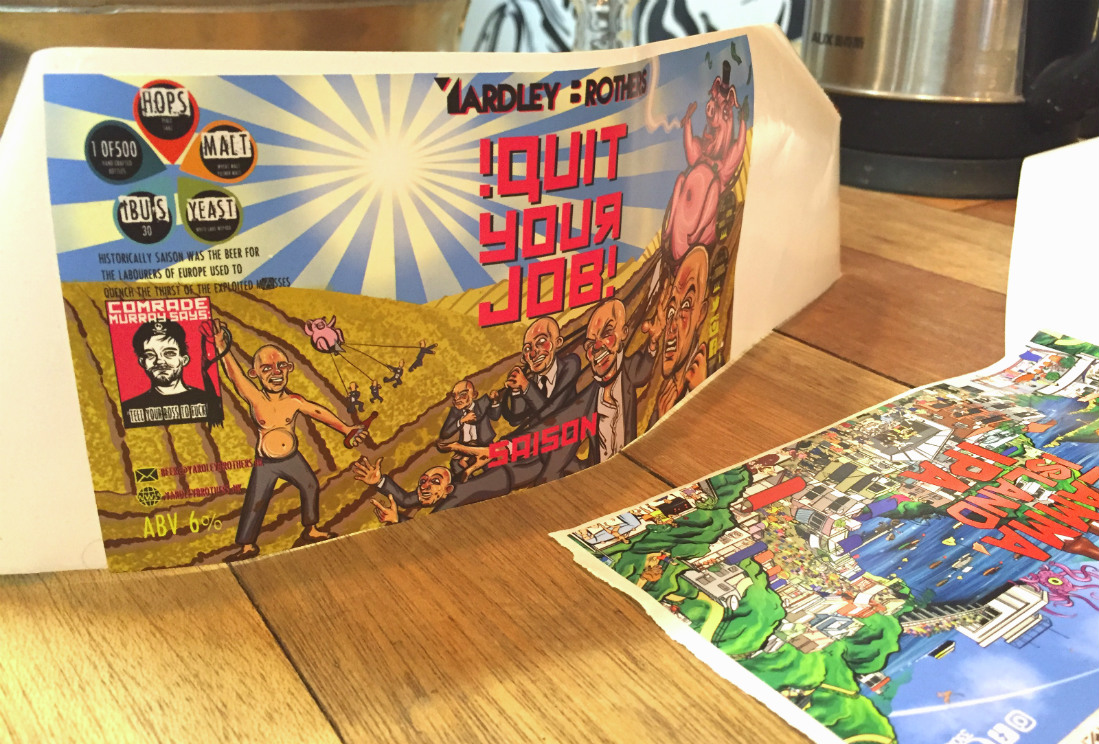
“Why does this all matter? Because in order for craft beer to keep its integrity – to stop the degradation and erosion of a beautiful ideal by corporate breweries who are increasingly attaching their tentacles to craft breweries all around the world – it is vital that we draw a line on the battleground of commercialism versus craft. Big Business has realised that there’s a quick buck to be made off of craft beer (or something that looks like craft beer) and it’s eroding the ideal of what craft is. Craft is not market-led. Craft is about individuality, about creating, about pushing the boundaries, about making something new – not about latching on to the latest trend.”
Read Yardley Brothers’ entire response to HK Yau on Coaster here. Written with heart on sleeve, it’s as much a rallying cry for truly independent Hong Kong craft as it is the brewery’s own unofficial mantra.
The Fruits of Flavor
“You know how people have perfect pitch? Luke has that with taste. It’s super weird,” says Gauthier.
Yardley dips into his private stash and pops the cork on a one-year-old bottle of what he calls a pure lambic. In other words, true to style it was spontaneously fermented through exposure to whatever bacteria and wild yeasts were attracted to it. All Yardley added to the base ale was raspberry pulp left over from another brew.
Gauthier continues.
“You tried the marmite stout; Luke can visualize the flavor of the thing having never tasted those flavors in combination before. I’ve learned to just go with it,” he says.
Yardley once considered a career in food, training to be a chef for about a year before heading to university. It didn’t go anywhere, and Yardley is quick to note that his short-lived stint in the kitchen was hardly a serious endeavour—just a job. Unlike toilet seat wholesaling, however, it did at least reflect an interest that Yardley would later find a way to harness.
“I’m really passionate about taste; it’s just something I really love. I love beer, but I could also be making wine because I love wine, too. I love whiskey,” Yardley says. “The thing about being a chef is that you have to work your ass off until really late at night, and you can only serve about 40 people a night in your restaurant. With beer, people can drink your beer everywhere everyday, and you get to go to bed early.”
I ask Yardley how he defines a great beer.
“I think a great beer is something exciting, something invigorating, and something with layers, as well,” he says. “I always think of taste like a line. You should be able to draw the taste with a line on a graph, with different sections that shoot up and last for a long time.”
Here at the brewery medals hang from two of the six taps, next to which are two framed certificates from the 2017 Hong Kong International Beer Awards, where Yardley Brothers’ Machine Men won the “IPA Session” category and its Framboise, a collaboration with Little Creatures Hong Kong, took the “Sour Beer” top honors. The medals are from the one-and-done Hong Kong Beer Championships, which were held at Brewtopia 2016. At that festival, Yardley Brothers earned “Best IPA” and the coveted “Best in Show” honors for its Hong Kong Bastard, a double IPA and probably the closest thing the brewery has to a core beer.
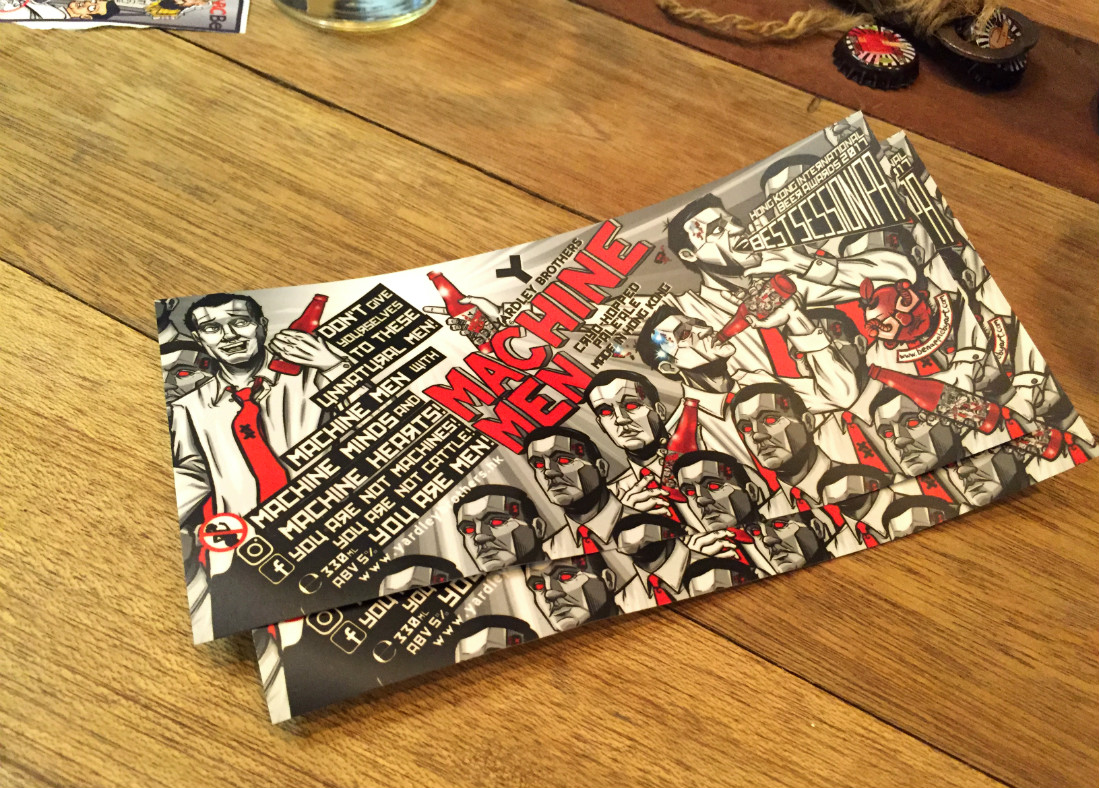
“The International Beer Awards include all beers sold in Hong Kong, whereas the Hong Kong Beer Championships was just local breweries. They canceled it because some of the bigger breweries complained when they didn’t win,” says Yardley with a smirk. “That’s fine, because we will forever be the winner of the Hong Kong Beer Championships.”
It’s worth noting that Yardley submitted Hong Kong Bastard for judging before he’d even opened the brewery, which officially launched a few weeks after Brewtopia’s awards presentation. Before that, Yardley and his brother Duncan (who has since followed a girl to Paris) brewed small batches of HK Bastard and Lamma Island IPA on a homebrew kit on Lamma Island at a beach shack—which is still there and open on weekends—before moving on to what Yardley calls “ghost brewing.” The two would rent a local brewery for a day, brew the beer, keg it unfermented, then bring the kegs back to the Lamma Island shack to innoculate them with yeast for fermentation.
“Every so often we made a beer that was fucking amazing, but obviously the beer was very yeasty,” says Yardley. “It was… interesting.”
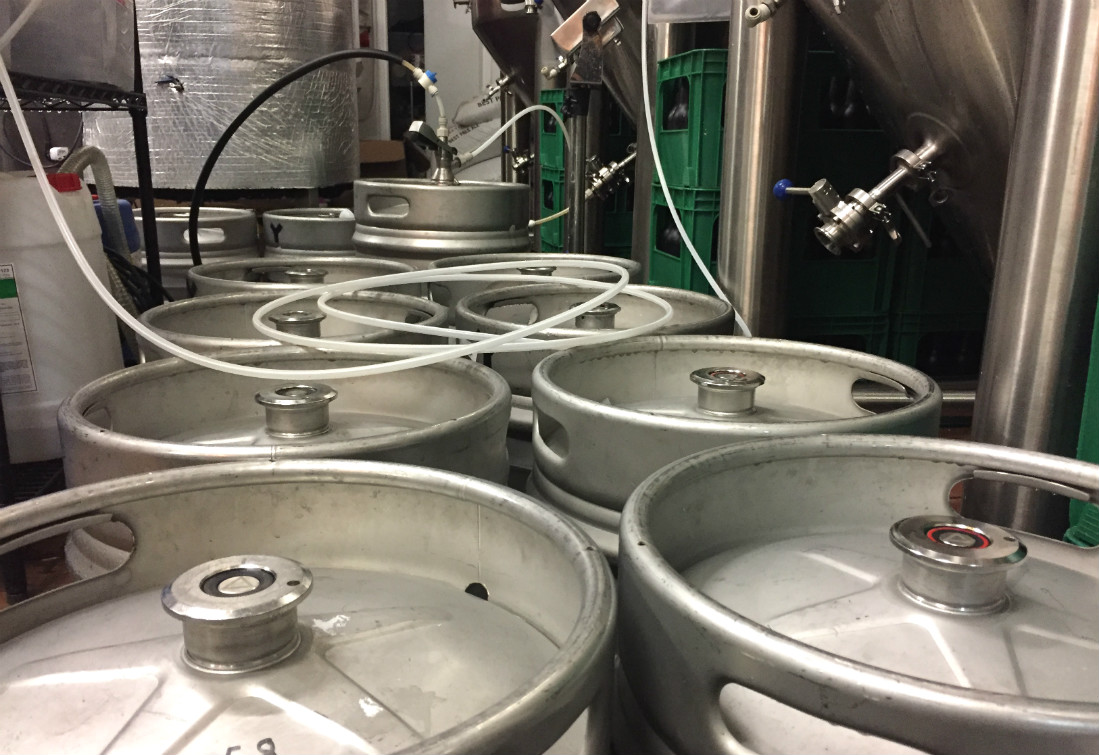
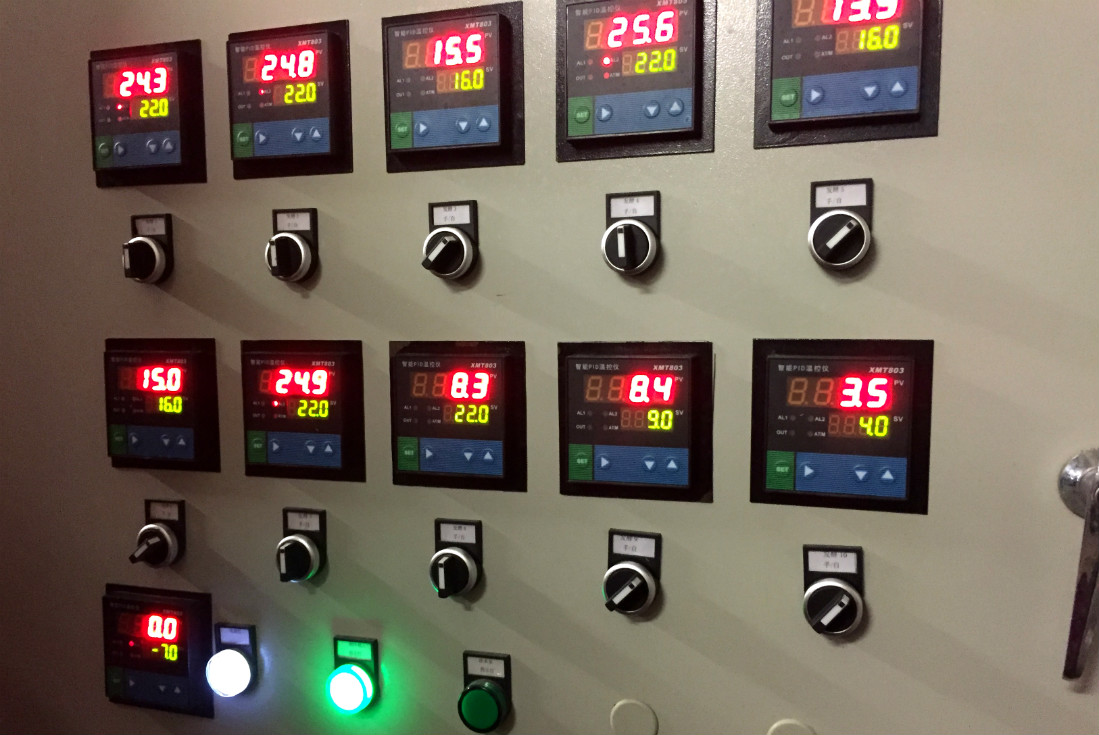
Today, following some facility expansions, the brewery’s specs include two brewkits and 12 fermenters, two of which are used for spontaneous fermentation. “It’s been an awesome learning experience, not only designing the brewery, but also as a brewer creating the beers and learning things about the brewhouse,” says Yardley. “It sounds weird, but I have a relationship with my brewhouse. You get to know how it works, and now it does what I want it to. It takes time.”
There’s a traditional wooden brewing vessel, as well, on which Yardley says requires “fucking hard work to make beer because there’s no automation at all.”
“That reminds me,” says Gauthier. “Can I get a low door in the mash tun? I have to scoop it out from the top and…”
Yardley turns to me, flashes a mischievious grin, and chuckles.
“Yes, eventually, Joseph. One day… one day.”
###
Yardley Brothers Beer opens for tastings on Fridays from 5pm – 7pm; tours are available by appointment. The Beer Shack on Lamma Island is open Saturday, Sunday, and public holidays from 1pm to 6pm. Visit the website for details, or email the brewery at beer@yardleybrothers.hk. Use the Yardley Brothers beer locator to track its distribution across Hong Kong.
All brewery photos copyright Beer Travelist and cannot be reused or reprinted without permission.


